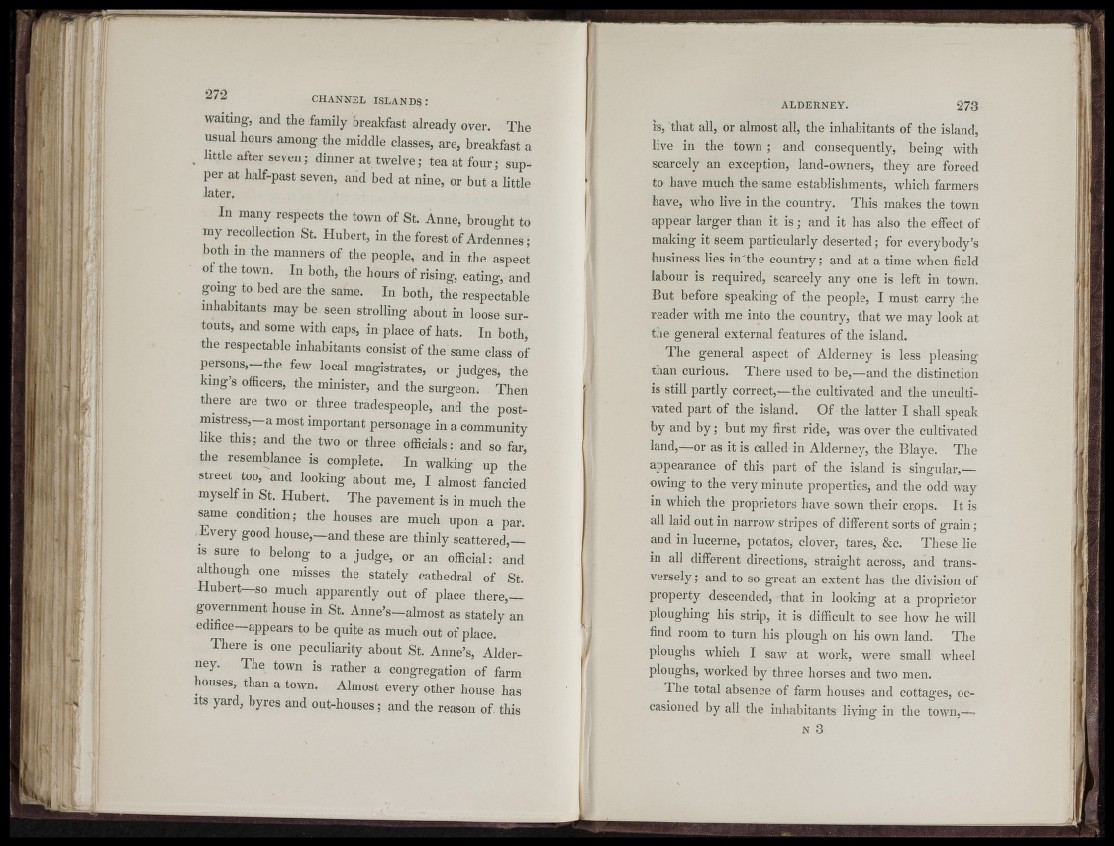
nB Ifi':
if 1
[iiL t p: 7
I X "
f
.! E
|i 'M
ii' -i
.a : ‘ : i ;' ; ■‘: 3 :1 ■'■ : f . I
; J ) ;.
, H Ei
!m U1
i ;A /: f. P il
•- ■X. '' i 1-" ' • rIE ; " PEH : pM * ■ - ’, 3■: ! /''/ ij . I1':;
;s/:. ?■■'
. ■■ ' p•" .:V:«! E • 'X-
' it
4
‘^ ^ 2 CHANNEL i s l a n d s :
waiting, and the family breakfast already over. The
usual hours among the middle classes, are, breakfast a
^ little after seven; dinner at twelve; tea at four; supper
at half-past seven, and bed at nine, or but a little
later.
In many respects the town of St. Anne, brought to
my recollection St. Hubert, in the forest of Ardennes ;
both in the manners of the people, and in the aspeci
ot the town. In both, the hours of rising, eating, and
p in g to bed are the same. In both, the respectable
inhabitants may be seen strolling about in loose sur-
touts, and some with caps, in place of hats. In both,
the respectable inhabitants consist of the same class of
persons,—the few local magistrates, or judges, the
king’s officers, the minister, and the surgeon. Then
there are two or^ three tradespeople, and the postmistress,—
a most important personage in a community
like tins; and the two or three officials: and so far,
the resemWance is complete. In walking up the’
street too, and looking about me, I almost fancied
myself in St. Hubert. The pavement is in much the
same condition; the houses are much upon a par.
Every good liouse,-and these are thinly scattered,—
IS sure to belong to a judge, or an official: and
although one misses the stately cathedral of St.
Hubert—so much apparently out of place there,—
government house in St. Anne’s—almost as stately an
edifice—appears to be quite as much out of place.
There is one peculiarity about St. Anne’s, Alderney.
The town is rather a congregation of farm
houses, than a town. Almost every other house has
Its yard, byres and oiit-houses; and the reason of this
I
is, that all, or almost all, the inhabitants of the island,
live in the town ; and consequently, being with
scarcely an exception, land-ovmers, they are forced
to have much the same establishments, Avliich farmers
have, who live in the country. This makes the town
appear larger than it i s ; and it has also the effect of
making it seem particularly deserted; for everybody’s
business lies in'the country; and at a time when field
labour is required, scarcely any one is left in town.
But before speaking of the people, I must carry the
reader with me into the country, that we may look at
the general external features of the island.
The general aspect of Alderney is less pleasing
than curious. There used to be,—and the distinction
is still partly correct,—the cultivated and the uncultivated
part of the island. Of the latter I shall speak
by and b y ; but my first ride, was over the cultivated
land,—or as it is called in Alderney, the Blaye. The
appearance of this part of the island is singular,—
owing to the very minute properties, and the odd way
in which the proprietors have sown their cr.ops. It is
all laid out in narrow stripes of different sorts of grain;
and in lucerne, potatos, clover, tares, &c. Tliese lie
in all different directions, straight across, and transversely
; and to so great an extent has the diAUsion of
property descended, that in looking at a proprietor
ploughing his strip, it is difficult to see how he Avill
find room to turn his plough on his own land. The
ploughs whicli I saw at work, were small Avheel
ploughs, worked by three horses and two men.
The total absence of farm houses and cottages, occasioned
by all the inhabitants living in the toAvn,—
N 3
I $
|{
»i
!i
(El
If
iE
: r ,
u
ill
LI 1»1